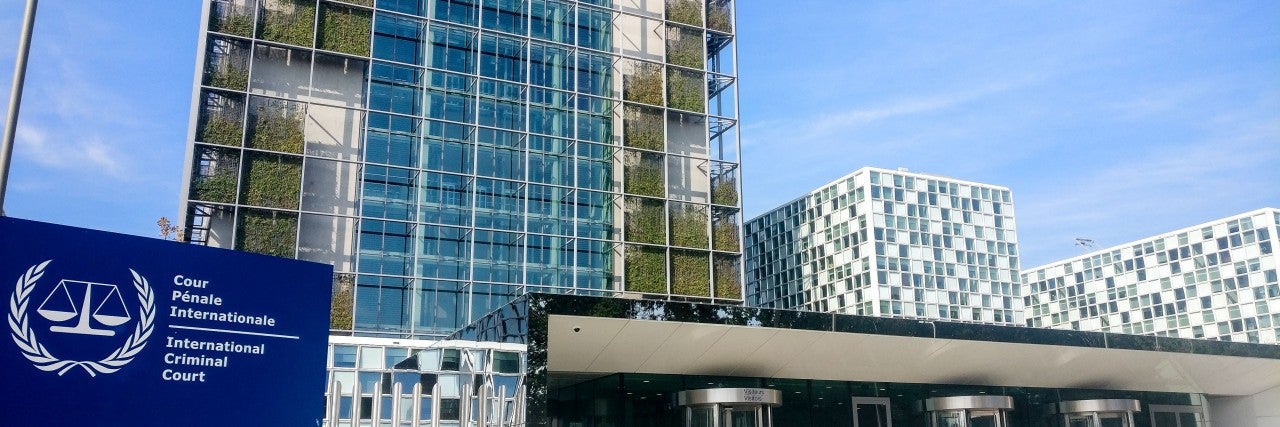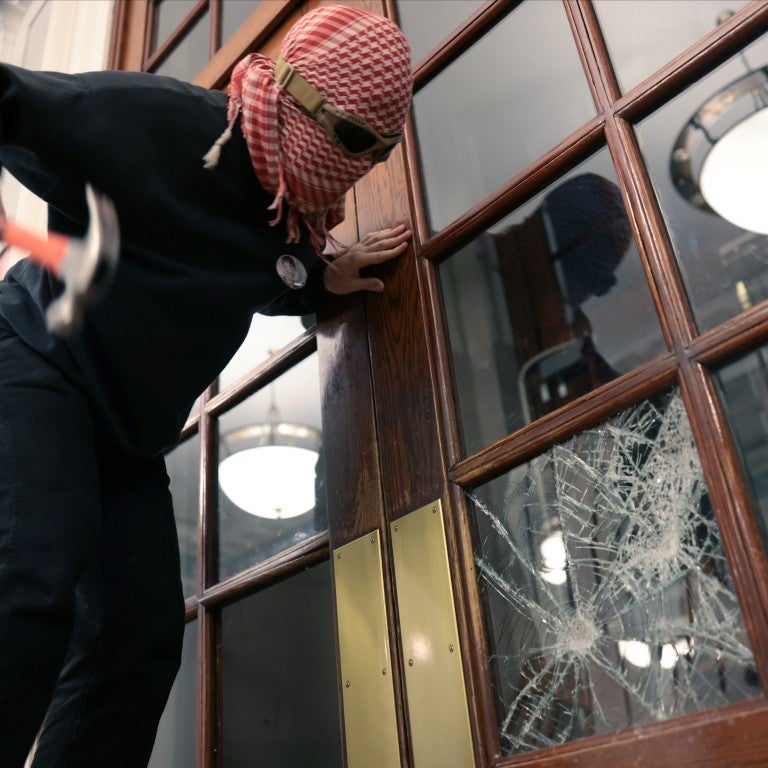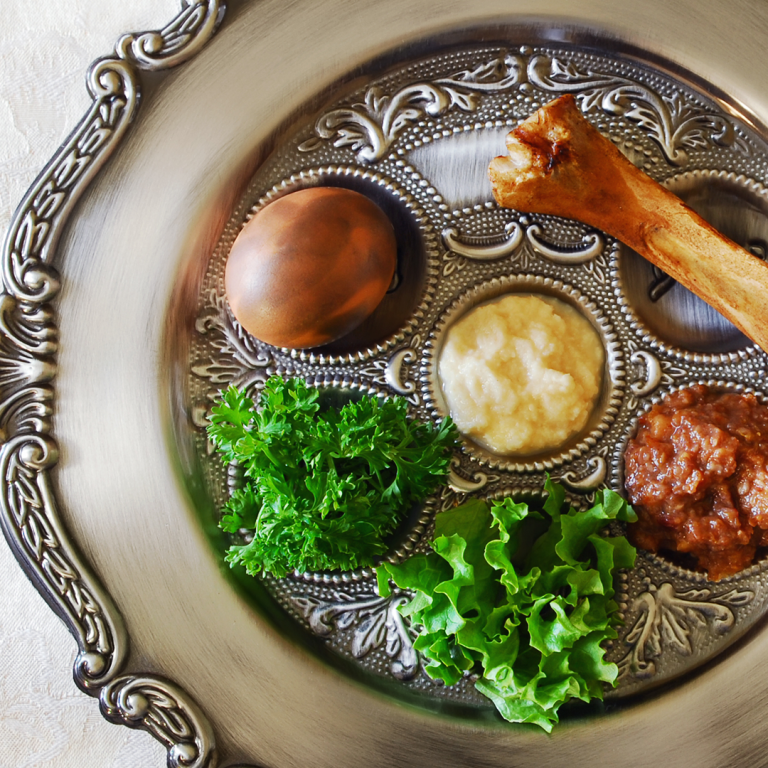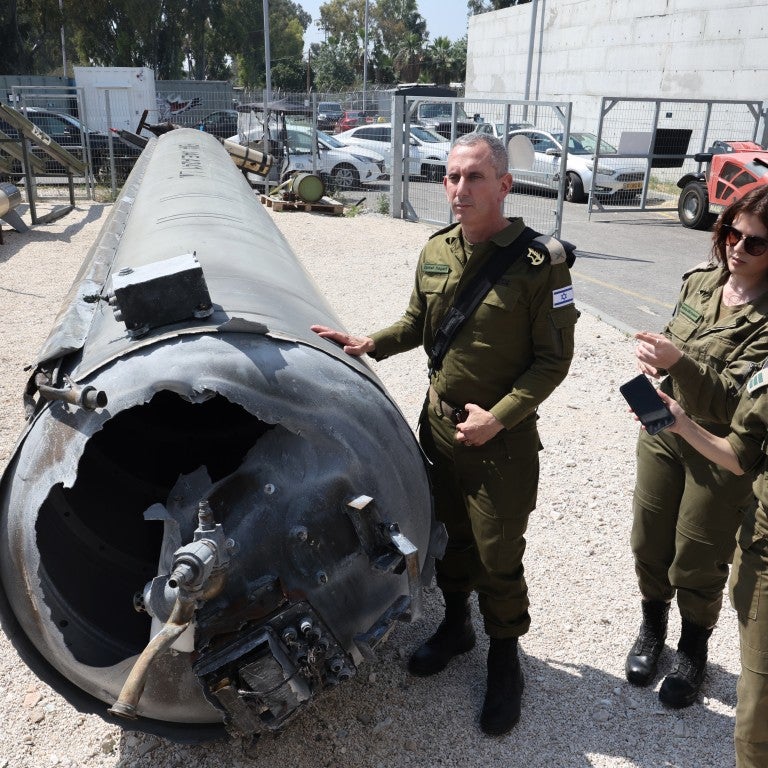February 18, 2021
Last weekend, the International Criminal Court at The Hague determined that it has jurisdiction in the West Bank and Gaza, taking a major step toward prosecuting Israelis for alleged war crimes. To help us unpack what’s been happening and what it means for Israel, we’re joined by Barak Ravid, Contributing Correspondent for Axios and Diplomatic Correspondent for Walla News.
Then we hear from AJC Chief Innovation Officer Belle Yoeli on the power of song during the pandemic, Manya Brachear Pashman on how Israel expects the unexpected, and Seffi Kogen on how snow is affecting both the United States and Israel.
Listen to this episode on Apple Podcasts, Spotify, and Google Podcasts.
Episode Lineup:
- (00:40) Barak Ravid
- (17:22) Belle Yoeli
- (19:26) Manya Brachear Pashman
- (22:12) Seffi Kogen
Episode Transcript
Seffi Kogen (0:40)
Last weekend, there was a major decision at the International Criminal Court (ICC) in The Hague that made it more likely that the body will try to prosecute Israelis for alleged war crimes. There's a lot to unpack here about the body itself, the charges against Israel, the players involved in, and what it all means for the Jewish state. Joining us now to help make sense of all this is Barak Ravid, a correspondent for Axios and the diplomatic correspondent at Israel's Walla News. Barak, thank you for joining us.
Barak Ravid (1:06)
Thank you. Thank you for having me.
Seffi Kogen (1:08)
So first of all, I feel like the terms, you know, the International Criminal Court, the ICC, the Hague, they get tossed around as though everyone knows what they are, but I'm not sure that that's the case. The ICC, is it part of the UN? Is it a different international body? What exactly is its purpose? What is the ICC?
Barak Ravid (1:23)
Seffi, I can tell you for a fact that the vast majority of people have no clue. And by the way, I don't blame anybody. It's not even for a foreign policy wonks. It's really for international law wonks. That's, that's really a small sect in the world. So it's not surprising that most of the people really don't know what it's all about. Let's try and explain. The International Criminal Court was supposed to be established, more or less after World War Two, as part of the lessons learned from that war. But at the time, the Cold War was just starting and the tensions between the Soviet Union and the United States did not allow to get a consensus to form such an International Criminal Court. So instead, they decided to form the International Court of Justice, also in The Hague. Many people get confused and mix up the two. The International Court of Justice deals with more, let's say, principled cases between different countries. While the International Criminal Court is like any criminal court, we know, okay, which means that it has suspicions, there are suspicions against a certain person for alleged war crimes. And this person if he's indicted, he's tried by the International Criminal Court. The International Criminal Court was only established in 2002, as part of the drafting of what is known as the Rome Statute. The Rome Statute basically said, what the International Criminal Court should investigate, what are the crimes that he should try people for, and all the countries that negotiated this treaty, at the end of the day had to sign it and approve it in order to be members of the International Criminal Court.
Seffi Kogen (3:19)
We in the U.S. and you in Israel have something in common, probably many things in common, in that neither of our countries signed the Rome Statute. Right, so what explains that opposition? Why was the U.S. opposed to joining the ICC?
Barak Ravid (3:31)
So again, the irony is that Israel was very involved in the negotiations leading up to the drafting of the Rome Statute and the establishment of the International Criminal Court. The reason at the end of the day, that Israel did not join the ICC and did not sign the Rome Statute was because one of the things that several Arab countries pressed very hard to include in the statute, as crimes that should be investigated by the International Criminal Court, were issues that have to do with transferring population into an occupied territory. And as you know, when Israel built the settlements in the West Bank, it moved its citizens into an occupied territory. And for many, many years, this was a main issue that Israel did not see, for example, as a breach for Geneva Convention. Okay, Article 49, in the Fourth Geneva Convention, is an article that Israel decided that it doesn't agree with. So Israel basically de facto implements the Fourth Geneva Convention, other than in the West Bank and Gaza, other than article 49 because it has to do with settlements.
Seffi Kogen (4:50)
Let me just ask this. So one of the things that is illegal quote unquote, under the Rome Statute is transferring members of a population into an occupied territory. And the reason that it's illegal is because, like, countries wanted to target Israel for doing just that?
Barak Ravid (5:07)
No, the Geneva Convention, okay, from the late 1940s already designated transferring of population into an occupied territory as something which is illegal, okay. What happened here was that at the end of the day, you need to decide, you can't just decide that okay, the ICC will investigate any crime that we think at the specific moment, it should investigate. No, they wanted to designate certain crimes that are, let's say, more serious, in order for the ICC to be able to focus on the really most obscene acts of war crimes, crimes against humanity, crimes of genocide, those kinds of things. And when they negotiated the Rome Statute, Arab countries decided to press for adding this issue of transferring of population into an occupied territory, as one of the things that constitute a crime that can be investigated by the court.
Seffi Kogen (6:11)
For the past few years, the prosecutor of the International Criminal Court has been investigating whether Israelis committed any war crimes. And actually she says she's investigating kind of both sides from the 2014 conflict in Gaza, from issues on the Gaza border in 2018, settlement construction, like you mentioned. And the decision that just came down last weekend, from something called the pre-trial chamber of the court was a decision as to whether the court had jurisdiction over Israeli war crimes. And like you were saying, Israel's not a member of the court, one would think that the court shouldn't have jurisdiction over Israel. So how is it possible that this pre-trial chamber found in fact that the ICC does have that authority?
Barak Ravid (6:56)
So, we need to go back to 2012. What happened then? So, the Palestinians went to the UN General Assembly, and upgraded their status from an observer entity or an observer organization, okay, into an observer state, which is not a full member of the UN. Once they did that, the sign on their table at the UN General Assembly changed to the State of Palestine. This might seem as a cosmetic change. But basically, the fact that the UN gave them a status of a state, even if it's not a full member of the UN, allowed them, several years later, to say that they can join several international treaties and statutes, one of them the Rome Statute. This is where it all started. This was the basis for the whole thing.
And then if you remember, in 2013-2014, John Kerry tried to negotiate a deal between Israel and the Palestinians. He failed, like many of his predecessors, and in March and April 2014, it all blew up. And when it blew up, Palestinian President Mahmoud Abbas started signing all those treaties, he wanted Palestine to join as a country, as a state. And at the beginning, he did not sign the Rome Statute. This was always seen as the nuclear option. But several months later, he did sign it. And once he signed it, and he did it, partially, because several months later, there was the Gaza War in 2014, with thousands of civilians killed in Gaza. So Abbas decided to sign the Rome Statute after the Gaza War, and to basically launch lawsuits against Israel on two issues. First issue was the Gaza War and excessive use of force by Israel and alleged targeting of civilians. And the other thing is the settlements, Israeli settlements in the West Bank. And because the UN already recognized Palestine as a country, so they could join the Rome Statute. Once they joined the Rome Statute, they're a member of the International Criminal Court. And once they are a member, they can file lawsuits. And once they file lawsuits, the basic thing the prosecutor needs to do is to open a preliminary examination. A preliminary examination is to start checking if there is even basis if there are evidence that warrant opening of a formal investigation.
This took, if I'm not mistaken, something like four years. Okay, so for four years, the prosecutor did this preliminary examination until a bit more than a year ago, the prosecutor announced that she found enough evidence to open a formal investigation against Israel and Hamas for the Gaza War and against Israel, for the building of settlements in the West Bank. But, she didn't really start an investigation. She went back to the judges to the pre-trial chamber of the judges, and asked them to give her an opinion and give her a green light on the geographical scope of the investigation and on whether Palestine really constitutes as a state. They determined, not unanimously, two judges decided in favor, one judge was against, that Palestine is a state and that its geographical scope for this specific request of the investigation. Okay, not for political reasons, not for final status agreement and not for a certain alleged crime.
And now, you would think that there would be an investigation, right? Not yet. The prosecutor with who by the way, finishes her job in four months, issued a statement saying that now she will need to study the verdict of the judges. This is quite a long verdict to read and study. One of the reasons she needs to study it is that basically, when you're four months away of finishing your job, you really need to discuss the matter with your successor, because it would be strange if you would commit your successor to such a huge case without even asking for his opinion. So this is where we are now. Basically, the current prosecutor will have to discuss the matter with the incoming prosecutor who was just elected several days ago, and decide whether this case will go forward.
Seffi Kogen (11:33)
You reported that Israel is lobbying countries to pressure the court to not now pursue a formal indictment to say, okay, the pre-trial chamber says this, but like now, we're not going to indict. Presumably, if an indictment were to be pursued Israel would try again to have countries kind of pitch in and speak up on its behalf. Certainly Israel tried this as well with the pre trial chamber and was unsuccessful, do you think that Israel can be successful in this push now>
Barak Ravid (12:01)
I think that at the end of the day, one of the things that the Israelis are looking for is to buy time. If they can manage to get the prosecutor to kick the can down the road to a successor, this will be a huge, huge, huge achievement for the Israeli Foreign Ministry and Ministry of Justice. They're counting on the fact that a you know it's a new prosecutor, it will take him time to get acquainted with all the cases. And they think that the new prosecutor has a more, let's say, conservative view of what the court and what the prosecutor's office needs to deal with and what not. And at least their hope is that the new prosecutor wouldn't want to get into this, or we don't want to deal with this hot political potato of starting to investigate alleged crimes in the Israeli Palestinian conflict, especially not an issue like the settlements.
Seffi Kogen (12:55)
Just to kind of bring us to a close here. I think the question that people aren't really grappling with is, is this fair, is this politicized? One issue we haven't touched on at all, is the kind of perpetual criticism of the ICC, is that it's only interested in African war crimes, and that there's kind of this European Western hegemony that is kind of being used on Africa, to enforce stereotypes to kind of criminalize the behavior of African warlords, etc, etc. So there's a not implausible theory that part of the reason why there was in the first place elected an African woman to be the prosecutor, and part of the reason why she was then interested in pursuing investigations into US conduct in Afghanistan, or Israeli conduct in Gaza, etc, is to kind of show like, hey, look, we're not only focused on Africa anymore, right? Like, but then Israel is just almost a scapegoat. Ultimately, would it be fair for Moshe Ya'alon, who was defense minister in 2014, or Benny Gantz, who was the IDF Chief of Staff then, is it really fair for them to be kind of brought on trial and in front of the world, as a result of this investigation?
Barak Ravid (14:02)
I'm not sure that this is a conflict that has two sides to it. And I'm sure that if you'll ask a Palestinian in Gaza, that was in Gaza in the 2014 war, or if you will ask a Palestinian that his land in the West Bank was grabbed by the Israeli government for building settlements. He will tell you that, of course, it's just, it's more than just it's almost a must. And if you ask an Israeli, he will tell you that this is, you know, bias. This is the most unjust thing. And this is like Prime Minister Netanyahu said in this, I think, hyperbole, that this is, you know, new antisemitism. So, there are two sides to this conflict. And each side has its own narrative. But, you know, there are also facts, you know, more than 2000 or around 2000 civilians were killed in the Gaza War in Gaza. There are no saints in this conflict, there are no good guys and bad guys. I'm sorry to say that both parties in recent years are the bad guys. Both sides are further apart than they were in the last three decades. The animosity is huge. The lack of trust is deep. And I think that part of it, partly this is how we got to the International Criminal Court.
In the eyes of the Palestinians, although, you know, the Israeli say, how can you say that building houses is a war crime? From Palestinian eyes, this is an existential threat on the future country. So this is why I'm saying that I'm not sure that getting into the discourse of, is this fair, is this just. Believe me, In the Israeli Palestinian conflict, usually, each side is sure that it is right. Okay, and that the other side is wrong, and that it is the most just and moral country in the world that the other side, oh, it's the most heinous country in the world. Unfortunately, both sides in the last decade, are doing everything they can to maintain the status quo, and to get further away from any possibility of peace.
Seffi Kogen (16:16)
You know, I think that Israel's defenders and advocates that I probably count myself among those occasionally make a mistake when they start to talk about the Israeli army as the most moral army in the world, because, frankly, I think that armies exist on a different spectrum. They shouldn't be ranked from most moral to least moral. War exists outside of morality. It is, you know, the legalized use of force and ultimately, killing against your opponents. That's a reality of, you know, realpolitik in the world. But that doesn't make it pleasant. And certainly, we have to grapple with the challenging things that can happen as a result of that.
Barak, thank you so much for sharing your expertise with us. And we'll certainly be watching the story as it continues to unfold in the months and frankly, in the years ahead.
Barak Ravid (16:59)
Thank you. Seffi.
Seffi Kogen (17:07)
It's time for our closing segment, Shabbat Table Talk. And joining us at our Shabbat table this week is Belle Etra Yoeli, AJC's Chief Innovation Officer. Belle, when you're talking with your family at your Shabbat table this weekend, what are you going to be talking about?
Belle Etra Yoeli (17:22)
Thank you, Seffi and Manya. This Shabbat, I find myself thinking about the power of song. I'm a singer, and I've had the privilege of singing in a variety of settings throughout my life. During the pandemic, I found myself missing opportunities to sing, especially with others. And recently I found myself being constantly reminded of the joy that singing brings to my life. During the last set of high holy days, I was brought to tears hearing members of my local congregation singing together the Shehecheyanu prayer on Zoom. That moment really emphasized something that is missing for all of us right now, that communal experience, and reminded me of true joy and meaning that I feel when I get to sing with others, whether in a prayer setting or a more casual setting. A few weeks ago, I finally watched The Greatest Showman, a movie musical starring Hugh Jackman, whose music was written by the same duo who wrote the hit Broadway musical Dear Evan Hansen. I was blown away by the film, and how much the music stuck with me. I cried from numerous songs as if I was reintroduced to the joy and the power of music to move us, and how it can create such a sense of wonder. I've listened to the soundtrack pretty much every day since and I highly recommend it. And for my most recent example, my two year old niece can't seem to stop singing "Chag Purim Chag Purim Chag gadol layehudim" as Purim approaches next week, a song about how Purim is a big holiday, a really important holiday for the Jewish people. Is there anything cuter or that pulls at the heartstrings more than a child singing songs from their tradition? As a granddaughter of a Holocaust survivor, someone who works at AJC, and is extremely invested in Jewish continuity, there are a few things in life and especially in this moment that bring me as much joy as little Abby singing Purim songs. Each week before Shabbat I tend to play the Maccabeat's moving version of Lecha Dodi sung to the tune of Hallelujah by Leonard Cohen. I sing along and let the beautiful melody take over me. Whether you have a talent to hold a tune, or simply enjoy singing in the shower, or love to take in some good music as part of your day, I hope we can all find some time to find more of this musical joy in our lives, when we continue to need it most. How about you Manya, what's on your mind this week?
Manya Brachear Pashman (19:26)
Well that's beautiful, and I do love to sing in the shower so I will take your advice and do it a little bit more. Seffi, Belle, at our Shabbat table we will be talking about snow. Snow in Jerusalem, snow in Texas, snow in our backyard. There's a lot of it. Usually by now I've had enough of winter. I travel to see my family in Texas where it's warmer. Well, usually. But without vaccines and without power across half that state this year, I have to embrace the long winter. Thankfully, for Hanukkah, my mother gave my kids Jewish sleds. Now, what makes them Jewish, you might ask? Steering wheels. I've already seen a fair share of children colliding with trees and other children these past few weeks, but thanks to those steering wheels, my kids have the ability to steer around the obstacles, even the mounds of snow they can't see from the top and scamper back up the hill safely. It is quite a sight for a Jewish mother to see their children scampering up the hill safely. I've watched in awe as the snow falls on the palm trees in Israel, and the country just deals with it. Honestly, they seem as prepared for this rare event as Chicago. I'm sure residents on the ground would disagree as they push their cars off roadways and deal with all the inconveniences. But compared to well, Texas, Israel seems to have followed the maxim to expect the unexpected. Now, perhaps because they've come to expect the worst. When at last a Jewish state became a reality they were attacked by their neighbors from all sides. When Hamas incites deadly riots that killed more than 100 Palestinians and injured thousands more, the UN Human Rights Council accuses Israel of war crimes for its soldiers actions, that makes no mention of Hamas his role in the conflict. When its vaccination program becomes the envy of the world, offering promise to curb the virus worldwide, a massive disinformation campaign launches to sow mistrust. Conspiracy theories about Jews? Huh, what a surprise. Now, of course, the Ministry of Health saw this coming and set up a command center, hired a dozen trackers to flag anti-vaxxer posts in Hebrew, Russian, Arabic, English, on Facebook, Twitter, Instagram and Telegram. The preparation is astounding. Which brings me back to those Jewish sleds. That ability to expect the unexpected and steer around it. Really, mom, best Hanukkah gift ever. Of course, I still hold my breath every time the kids push off down the hill. Because really, haven't we all been holding our breath for the past year, waiting for a loved one to get sick or to get sick ourselves? Waiting for election results waiting for the next dose of bad news. It's been hell, really. Finally, it seems that the hell might be freezing over and we can now look forward to a real spring thaw. And that's what we'll be talking about at our Shabbat table. Seffi?
Seffi Kogen (22:12)
Thanks Manya. Unsurprisingly, snow has been on my mind too. This week, it seems to have snowed everywhere. Yesterday, Wednesday, the last remnants of our two week old snow had mostly melted away in New York, when today, right on schedule, we got more snow. Earlier this week, snow and ice storms blanketed much of the country, and as Manya mentioned, they cause particular damage in Texas, where people are still going without heat, power or running water. Snow, which was such a delight when I was a little kid now seems like a nuisance to my life here in the city. And worse, it seems life threatening in parts of the country like Texas, where state officials haven't adequately prepared the infrastructure to withstand a storm. But indeed, snow can still bring delight in places like Israel. Despite the headaches that come with it, Israelis were thrilled to see snow this week in Jerusalem and the surrounding areas. In the brief hours when there was a thin blanket of snow on the ground there, my WhatsApp was blessed with pictures from friends showing me the views from their windows and porches, of their own little winter wonderland. One person even sent me a picture of the beautiful little snowman he made in his garden with little blueberries for eyes. This Shabbat I'll be trudging through piles of snow, slicks of ice, and puddles of slush as I make my way to synagogue. And I'll be worrying about my fellow Americans in Texas, though I hope by then at least they'll have their heat back. But at my Shabbat table, I'll try to think of my friends and family in Israel, and smile at the joy that a snow day can still bring if you have the right mindset. Shabbat shalom.
Manya Brachear Pashman (24:00)
Shabbat shalom.
Belle Etra Yoeli (24:02)
Shabbat shalom.





